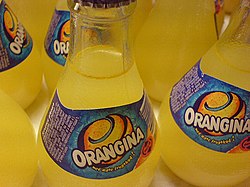Orangina
Orangina (/ oʁãˈʒiːna /) is the brand name of a carbonated soft drink made from orange and tangerine extracts with the special feature that it also contains real fruit pulp (similar to freshly squeezed fruit juices ).
history
The drink was originally developed by the Spanish pharmacist Augustin Trigo Mirallès and presented to the public in 1935 under the name Naranjina at a trade fair in Marseille . There the Frenchman Léon Beton bought the distribution rights and introduced the name Orangina. Production initially took place in Boufarik ( Algeria ). Orangina was successfully introduced in France in 1951. After Algeria's independence in 1962, production was relocated to Marseille, and Orangina spread increasingly in France under the leadership of Léon's son Jean-Claude Beton (1925-2013).
Orangina is widespread in Europe , primarily in France and Switzerland, but is also known in North America, where production originally took place in Canada , but has now been relocated to Hialeah , Florida.
The Orangina brand belonged to the Cadbury-Schweppes Group until 2006 and was bought as Orangina SARL by the investment group Lion Capital and The Blackstone Group . The brand has been distributed worldwide by the Japanese Suntory Group since 2009 . The only exception is North America, where the distribution rights are held by Dr Pepper Snapple .
Orangina has been marketed in Germany and Austria since May 2006 by the Krombacher Brewery (since at least 2012 under the company name Schweppes Deutschland GmbH ) and in Switzerland by Aproz Sources Minérales .
As a result of the sugar tax , Orangina's sugar content in Great Britain has been reduced by around half.
In France there is also sour Orangina wine gum from Haribo , which is similar in shape to the classic Orangina bottle and is reminiscent of the taste of the drink.
Other sodas of the same name
In addition to the orangina, which is known today, there were other drinks of the same name that were not associated with it.
Eglisau orangina
From 1935 to the 1980s, Mineralquellen Eglisau , which also produced Vivi Kola , sold an orange lemonade without pulp under the same name, but with different lettering and a different bottle shape. It was advertised with several artistic advertising subjects.
Orangina in the GDR
In the GDR , the VEB Neubrandenburger Brewery also produced a fruit juice drink under the name Orangina.
Individual evidence
- ↑ a b c History of Orangina ( Memento of the original from December 2, 2012 in the Internet Archive ) Info: The archive link was automatically inserted and not yet checked. Please check the original and archive link according to the instructions and then remove this notice. . Official website (English). Retrieved September 6, 2013.
- ^ A b William Yardley: Jean-Claude Beton, Who Sent Orangina Around the World, Dies at 88 . In: New York Times , December 6, 2013. Retrieved January 5, 2014.
- ↑ a b Orangina | Dr Pepper Snapple Group. Accessed February 5, 2018 .
- ↑ Father of the cult lemonade "Orangina" is dead . In: T-Online , December 3, 2013.
- ↑ Suntory | Brands | Orangina . In: Suntory . ( suntory.com [accessed February 5, 2018]).
- ^ Lars Gotsch: Fanta & Co. - The sweeter life in Switzerland. In: srf.ch. September 19, 2018, accessed October 30, 2019 .
- ↑ Brigitte Wenger, Amanda Arroyo: Less sugar. One cube - many interests. In: srf.ch. October 29, 2019, accessed October 30, 2019 .
- ↑ VEB (B) Neubrandenburger Brewery Neubrandenburg afG GDR lemonade ORANGINA - MDN | eBay. Retrieved February 5, 2018 .
